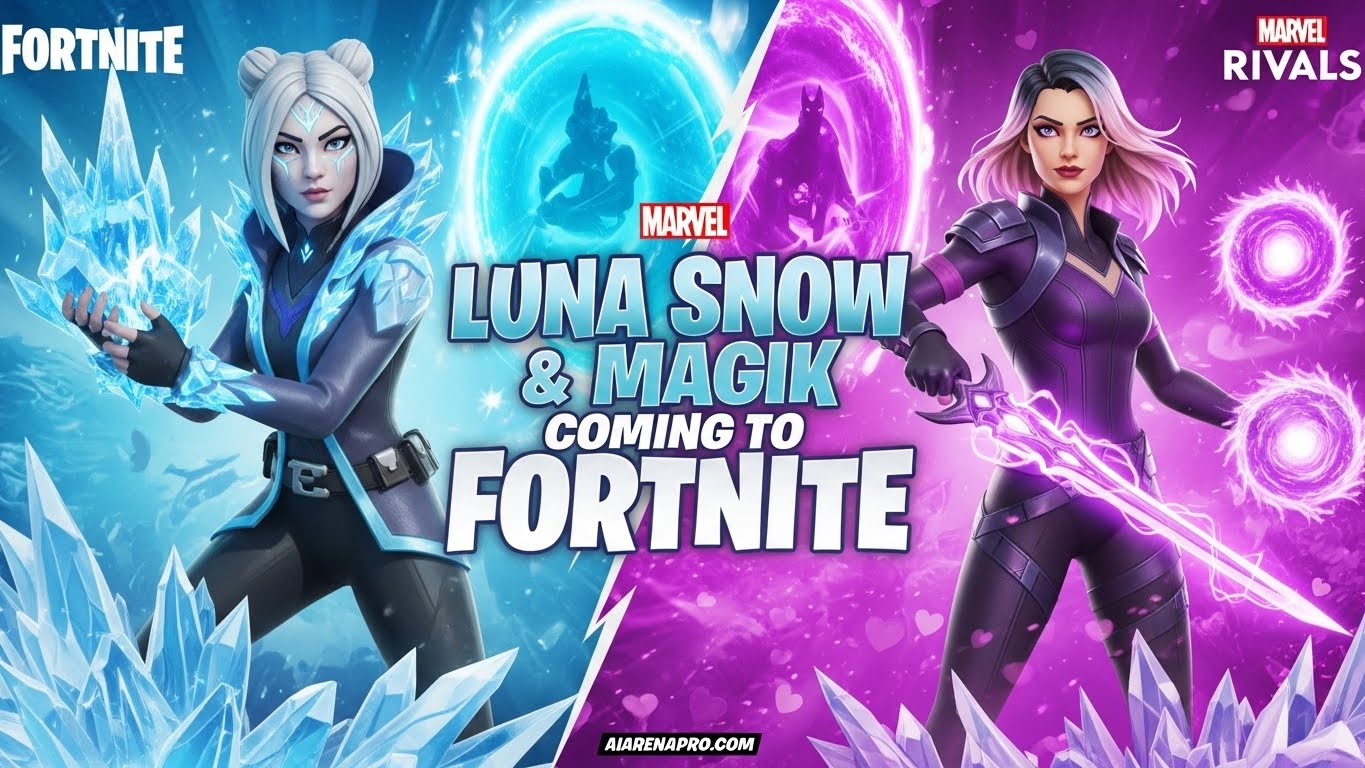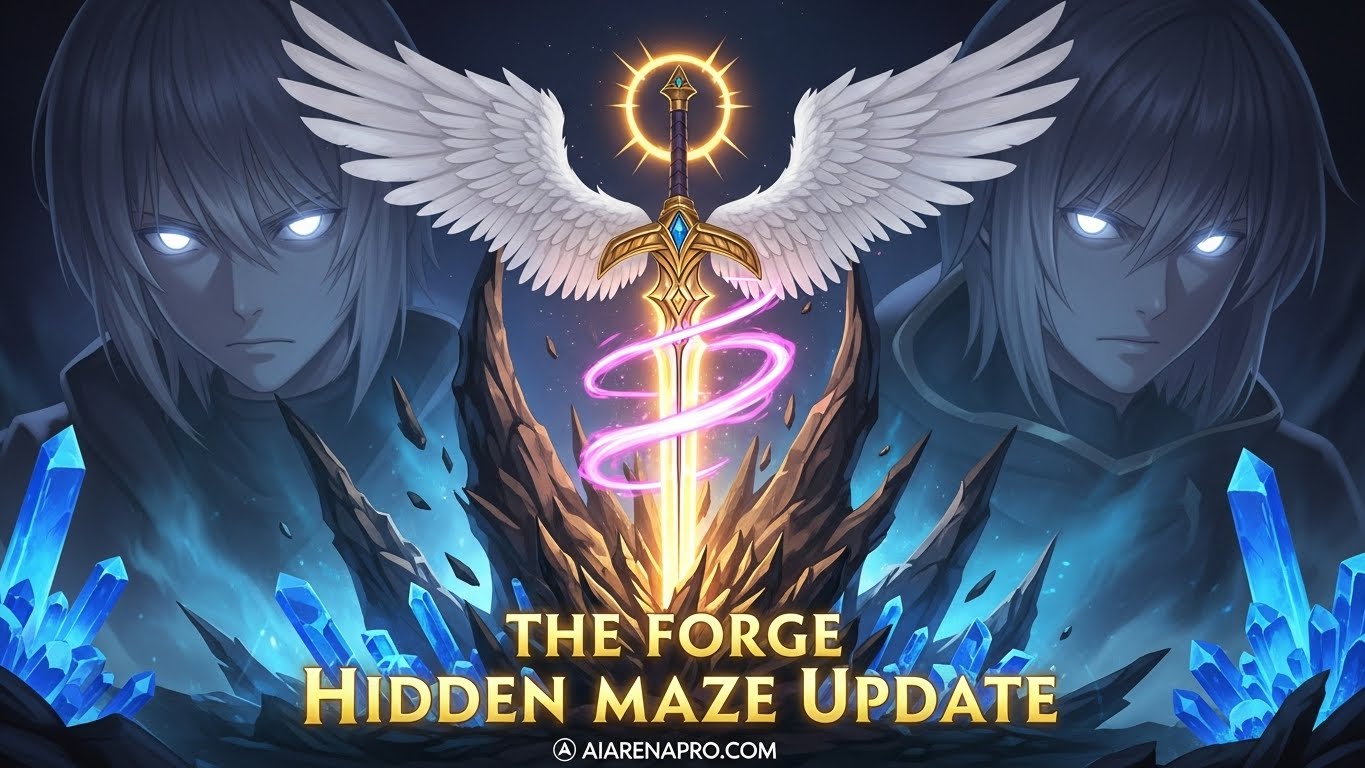
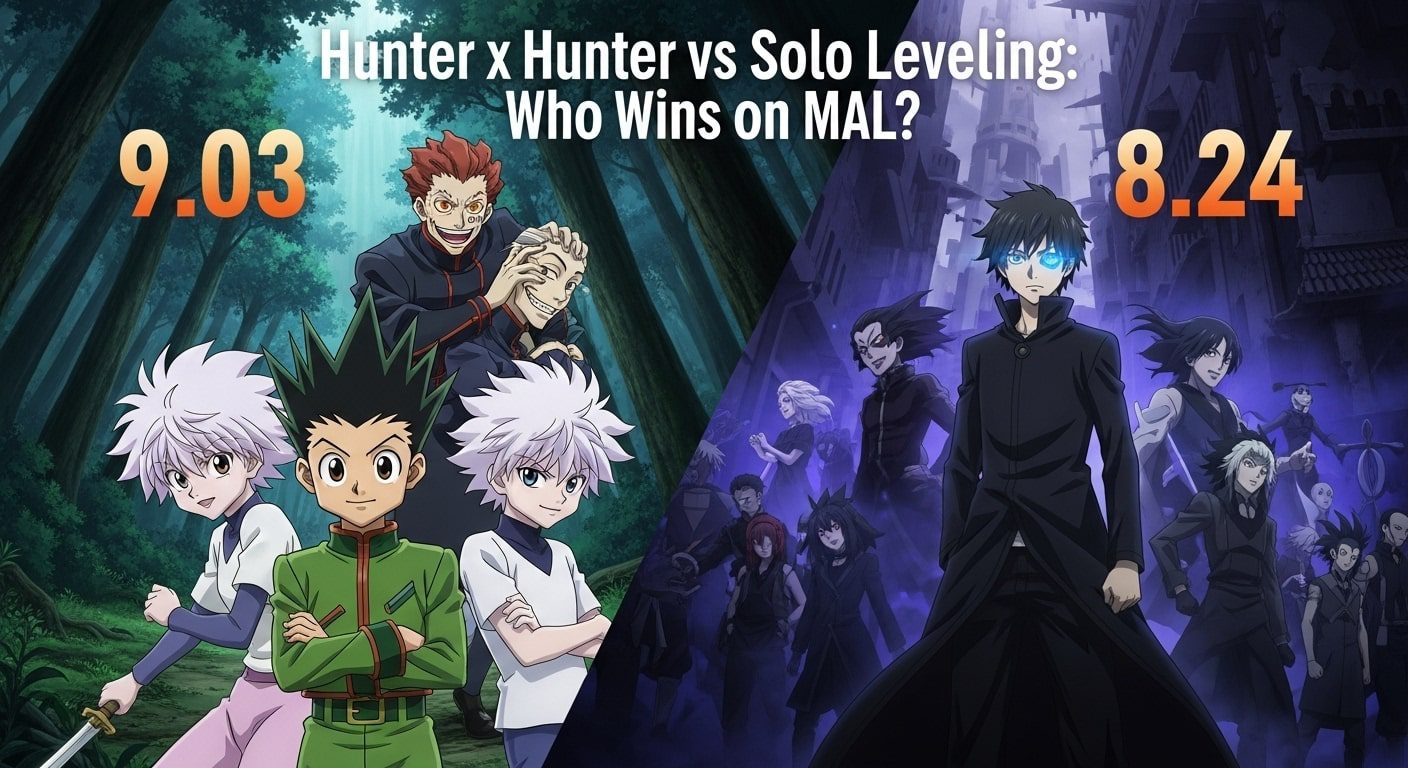
Is Hunter x Hunter Superior to Solo Leveling Despite Being “Overlooked”? Hunter x Hunter’s impressive 9.03 MyAnimeList rating positions it among anime’s elite, showcasing narrative sophistication and thematic complexity that significantly outshines Solo Leveling’s 8.24 score, even as Solo Leveling claimed the Anime of the Year award 2026.
Through extensive analysis of both series and their respective gaming adaptations, this guide explores why Hunter x Hunter stands as an enduring masterpiece while Solo Leveling remains an visually impressive but narratively shallow power fantasy.
| Comparison Aspect | Hunter x Hunter | Solo Leveling |
|---|---|---|
| MAL Rating | 9.03 (Elite Tier) | 8.24 (Mid Tier) |
| Narrative Complexity | Intricate, Multi dimensional | Straightforward Power Fantasy |
| Gaming Integration | Tactical Nen Mechanics | Basic RPG Progression |
Here’s what this analysis covers:
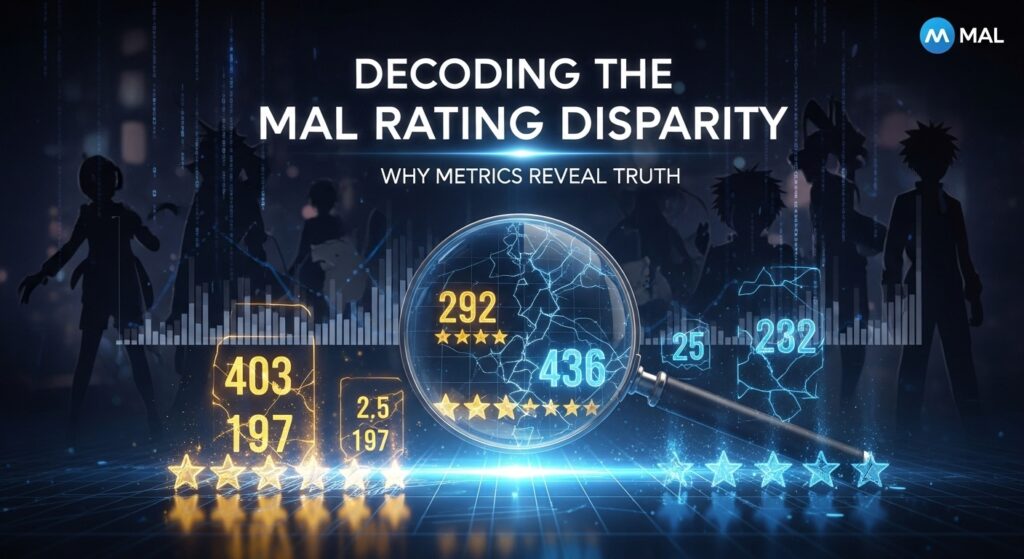
When Solo Leveling secured the Crunchyroll Anime Awards in 2026, examining MyAnimeList revealed a telling disparity. Hunter x Hunter maintains its 9.03 rating among anime’s highest echelons, while Solo Leveling sits at 8.24 a substantial gap reflecting core quality differences rather than minor variations.
MyAnimeList’s scoring system demands consistent excellence across time. Hunter x Hunter has preserved its elite status through multiple anime cycles, weathering trends that have claimed countless “seasonal favorites.” The 2025 awards season demonstrates how popularity contests often diverge from genuine quality assessments.
These ratings carry particular weight due to MAL’s user demographics. The platform’s community consists largely of seasoned anime enthusiasts who’ve consumed hundreds of series. These aren’t casual viewers influenced by marketing hype or visual spectacle they’re analytical consumers who recognize narrative craftsmanship, character evolution, and thematic resonance. Solo Leveling’s lower rating despite its commercial success reveals the disconnect between marketing triumph and artistic merit.
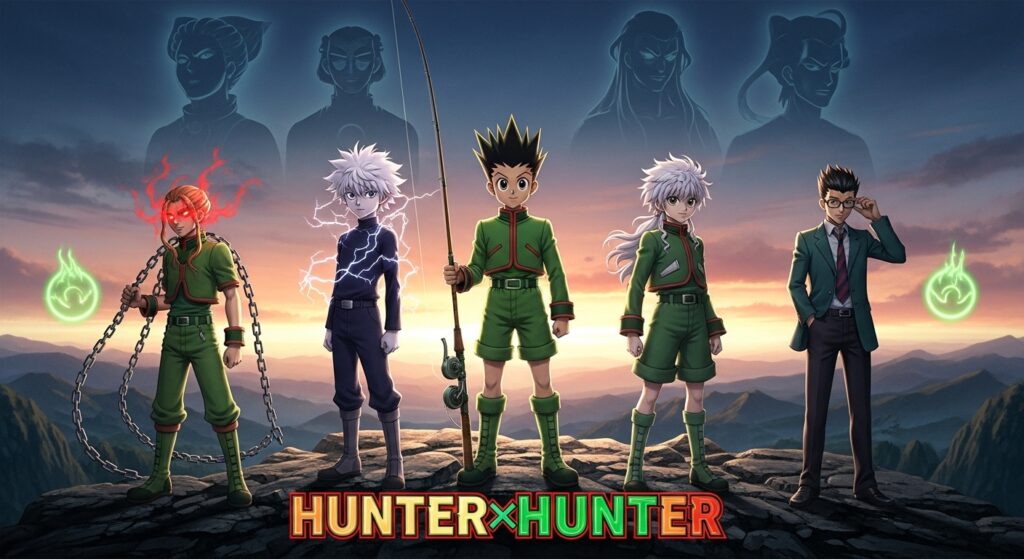
Hunter x Hunter earned its legendary reputation through uncompromising creative excellence. Multiple viewings of its 148 episode run reveal narrative layers that no comparable shonen series achieves. The Chimera Ant arc alone contains more philosophical exploration, character development, and emotional gravitas than Solo Leveling’s complete adaptation.
Hunter x Hunter’s genius lies in subverting traditional shonen expectations. While Solo Leveling delivers predictable power escalation, HxH presents Gon’s psychological deterioration during the Chimera Ant arc a transformation that fundamentally challenges protagonist conventions. Episode 131’s portrayal of Gon’s metamorphosis creates genuine psychological discomfort that Solo Leveling’s straightforward formula never attempts.
The Nen system represents anime’s most sophisticated power framework. Unlike Solo Leveling’s elementary progression mechanics mimicking basic MMO systems, Nen demands strategic planning, personal cost assessment, and innovative application. Each character’s abilities mirror their psychology, transforming battles into intellectual contests rather than statistical comparisons. This complexity translates into richer interactive potential than Solo Leveling’s number based advancement.
Yoshihiro Togashi’s writing elevates every storyline beyond genre conventions. The Yorknew City arc transforms a heist narrative into sophisticated commentary on vengeance, loyalty, and moral complexity through the Phantom Troupe dynamics. The Chairman Election arc handles political intrigue with greater nuance than dedicated political dramas. Even the foundational Hunter Exam arc contains strategic depth and character development that rewards analytical viewing.
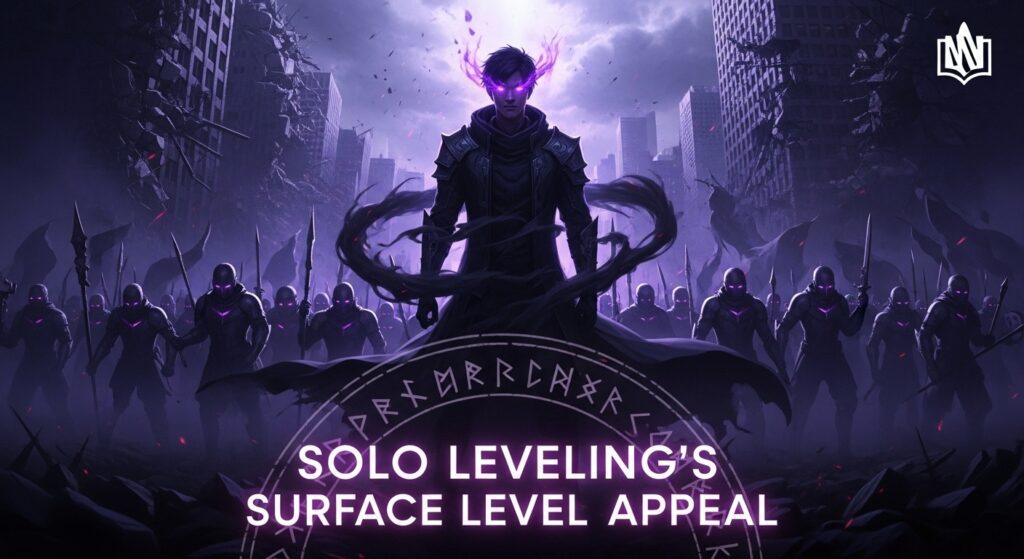
Solo Leveling’s anime adaptation delivers undeniable visual excellence. A-1 Pictures’ production showcases cutting edge animation technology, and Sung Jin woo’s increasingly dramatic battles provide instant gratification. However, this immediate satisfaction reveals the series’ fundamental limitation: Solo Leveling functions as entertainment fast food momentarily satisfying but nutritionally vacant.
Having experienced the complete manhwa before the anime’s release, the adaptation’s trajectory was entirely predictable: a wish fulfillment fantasy that never challenges its protagonist or audience. Jin woo’s evolution from “weakest hunter” to “shadow sovereign” follows such formulaic progression that episodes become interchangeable without consequence.
The supporting cast weakness becomes most apparent through comparison. Hunter x Hunter develops every character into complete individuals with distinct motivations, philosophies, and growth trajectories. Solo Leveling reduces its supporting cast to Jin woo’s power validation system. Characters like Cha Hae in or Go Gun he exist purely to showcase the protagonist’s strength, lacking independent agency or meaningful development.
The Jeju Island arc, frequently cited as Solo Leveling’s pinnacle, exemplifies this limitation. Where Hunter x Hunter’s Chimera Ant arc explores themes of humanity, evolution, and sacrifice through similar “overwhelming threat” premises, Solo Leveling’s approach reduces to “Jin woo appears and dominates.” The arc contains no genuine tension, meaningful sacrifice, or thematic exploration merely another power demonstration that could conclude in half the runtime.
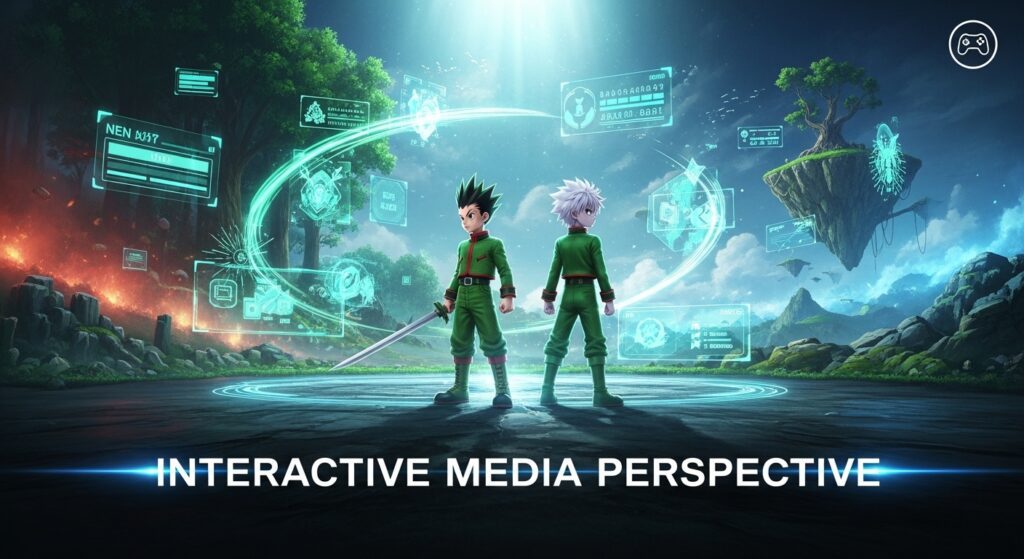
Extensive experience with anime adapted games reveals Hunter x Hunter’s superior interactive translation potential. The Nen system’s six categories and individualized Hatsu abilities create natural character diversity that fighting games require. Implementing Hisoka’s Bungee Gum properties versus Chrollo’s ability theft mechanics would demand completely different strategic approaches and gameplay styles.
Solo Leveling’s gaming appeal, while superficially obvious through its RPG elements, actually suffers from oversimplification. The manhwa essentially reads as someone’s MMO power fantasy playthrough, complete with system notifications and stat displays. However, what functions as wish fulfillment in narrative form creates monotonous gameplay when your protagonist commands shadow armies that trivialize every encounter, strategic depth evaporates.
This pattern extends throughout successful isekai gaming adaptations. The most engaging interactive experiences emerge from series with balanced, complex power systems rather than linear progression mechanics. Hunter x Hunter’s Greed Island arc literally occurs within a game environment, demonstrating sophisticated game design understanding that Solo Leveling’s surface level RPG aesthetics never achieve.
Nen’s restriction and condition mechanics mirror risk reward systems that exemplary games employ. Kurapika’s chains gaining power against the Phantom Troupe while threatening his life if misused creates authentic stakes. Gon’s sacrifice of future potential for immediate power against Pitou represents ultimate high risk decision making. Solo Leveling never presents such meaningful choices Jin woo simply grows stronger without genuine cost or consequence.
Examining r/HunterXHunter and r/sololeveling communities reveals distinct demographic patterns. The Hunter x Hunter subreddit, exceeding 500,000 members, regularly features complex theoretical discussions, philosophical debates about Chimera Ant themes, and detailed character analyses. Posts exploring Meruem’s character development nuances generate hundreds of sophisticated literary responses.
The Solo Leveling community, while highly active and enthusiastic, focuses primarily on power scaling discussions, animation quality appreciation, and speculation about Jin woo’s next advancement. This content isn’t inferior power fantasies serve legitimate entertainment purposes but it highlights fundamental differences in series offerings.
Age demographics reveal additional insights. Conversations with fellow anime enthusiasts show Hunter x Hunter resonating more with mid twenties to thirties viewers who’ve consumed anime for years, while Solo Leveling captures younger audiences or anime newcomers. This observation isn’t gatekeeping it recognizes that sophisticated shonen series often require contextual experience for full appreciation.
Fan discussion patterns prove particularly revealing. Hunter x Hunter enthusiasts cite specific scenes, character moments, and thematic elements Meruem and Komugi’s gungi sessions or Gon’s moral deterioration. Solo Leveling fans typically mention impressive fights, animation sequences, or Jin woo’s “coolness factor.” Both represent valid enjoyment forms, but one clearly offers more substantial analytical content.
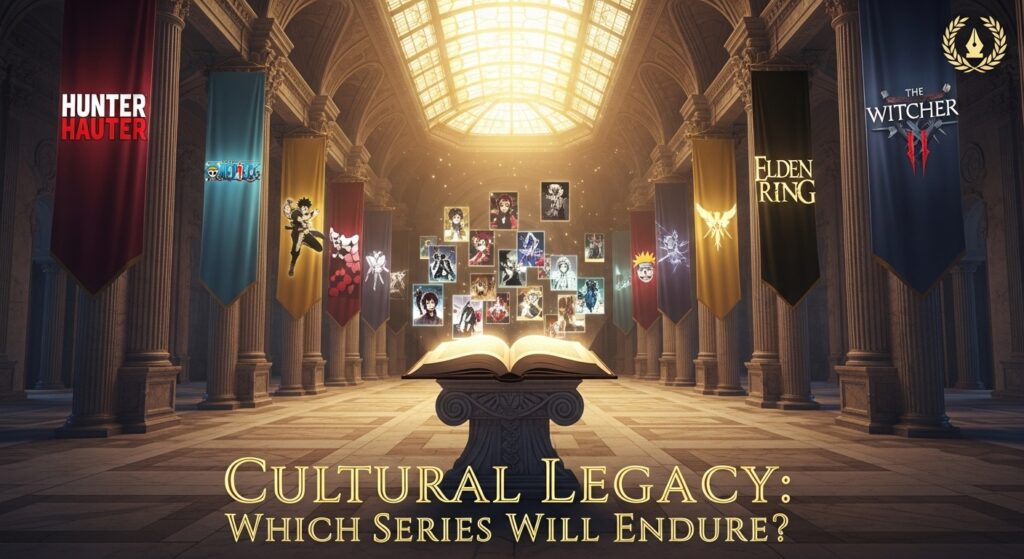
Examining anime’s lasting cultural influence shows longevity trumping momentary popularity. Hunter x Hunter, despite Togashi’s notorious hiatuses, maintains cultural relevance through storytelling excellence. The series influences emerging manga creators, inspires game developers, and continues generating discussion years post anime conclusion.
Solo Leveling’s impact appears more ephemeral, riding current Korean webtoon adaptation trends and power fantasy popularity. Its contribution to anime culture amounts to spectacular animation demonstrations and proof of manhwa adaptation viability. However, will Solo Leveling’s themes and characters generate discussion decades from now? Based on similar series’ peak and fade patterns, this seems unlikely.
This comparison mirrors examining classic 90s anime that achieved timeless status. Series like Evangelion, Berserk, and the original Hunter x Hunter endure because they transcend surface level entertainment. They challenge audiences, present complex themes, and create genuinely human characters despite fantastic circumstances.
Describing Hunter x Hunter as “overlooked” fundamentally misrepresents its status. The series maintains massive active communities, generates constant discussion, and influences modern anime creation. Its MAL rating remains stable despite years since conclusion. Solo Leveling’s temporary spotlight creates illusory “forgotten” status for Hunter x Hunter, but this reflects current hype versus sustained excellence.
Dark fantasy anime like Solo Leveling often follow similar patterns massive initial popularity followed by gradual decline as audiences migrate to new seasonal sensations. Hunter x Hunter avoided this fate through exceptional writing that rewards repeated viewing and deeper analysis.
Recent experience introducing both series to a newcomer proved illuminating. After completing both, they described Solo Leveling as “entertaining but forgettable” while Hunter x Hunter left them emotionally devastated and immediately beginning a rewatch. This reaction perfectly illustrates why one series ranks among anime’s greatest while the other represents temporary entertainment.
Solo Leveling’s animation absolutely surpasses Hunter x Hunter’s 2011 adaptation in pure visual spectacle. A-1 Pictures leveraged modern animation technology creating fight sequences that trend on social media weekly. Every Jin woo battle becomes a sakuga showcase that animation enthusiasts rightfully celebrate.
However, decades of gaming and anime consumption teach that graphics don’t define quality. Some beloved games feature dated visuals but timeless mechanics. Similarly, Hunter x Hunter’s modest animation (which includes stunning moments, particularly in the Chimera Ant arc) never diminishes its narrative impact. Netero’s Zero Hand against Meruem carries emotional weight transcending any animation limitations.
Character design philosophy reveals another technical disparity. Solo Leveling’s characters appear stylish but generic, following standard manhwa attractive character templates. Hunter x Hunter’s diverse, sometimes bizarre character designs reflect personality and purpose. Hisoka’s clown aesthetic isn’t merely stylistic it represents his performative, chaotic nature.
Comprehensive analysis confirms Hunter x Hunter’s 9.03 MAL rating accurately reflects its superiority over Solo Leveling’s 8.24. This assessment doesn’t dismiss Solo Leveling it succeeds as entertaining power fantasy with exceptional animation. However, comparing overall quality, narrative depth, character development, thematic complexity, and lasting impact reveals Hunter x Hunter operating on an entirely different level.
For anime enthusiasts, particularly those from gaming backgrounds who appreciate complex systems and strategic depth: experience both series while understanding their distinct offerings. Solo Leveling provides immediate gratification and visual spectacle perfect for casual consumption. Hunter x Hunter demands attention and emotional investment but rewards viewers with one of the medium’s greatest achievements.
For those exploring controversial anime worth experiencing, remember that popularity and quality rarely align perfectly. The finest anime, like exceptional games, often challenge audiences rather than simply entertaining them. Hunter x Hunter exemplifies this principle, earning its elite position through uncompromising creative vision rather than trend following appeal.
When examining complex anti heroes in isekai anime, sophisticated character development and moral ambiguity create enduring impact. Hunter x Hunter’s approach to character growth and ethical dilemmas establishes standards that power fantasy series struggle to achieve.
Hunter x Hunter achieved its 9.03 rating through exceptional storytelling, sophisticated character development, innovative power systems, and thematic depth that resonates with experienced anime viewers. The series maintains consistent quality across 148 episodes, with arcs like Chimera Ant considered among anime’s finest achievements. Solo Leveling’s 8.24 rating reflects its nature as entertaining but shallow power fantasy prioritizing spectacle over substance.
From analytical perspective, yes. Solo Leveling benefits from recency bias, exceptional animation quality, and effective marketing that secured its Anime of the Year 2026 award. However, when evaluated on storytelling merit, character development, and thematic complexity, it significantly underperforms compared to Hunter x Hunter’s achievements. The series functions as casual entertainment but lacks depth defining truly exceptional anime.
Paradoxically, despite Solo Leveling’s obvious RPG aesthetics, Hunter x Hunter offers more for gaming enthusiasts appreciating strategic depth. The Nen system’s complexity, restriction based power scaling, and tactical combat create natural gaming mechanics that numerous fan games have attempted replicating. Solo Leveling’s straightforward leveling system appears more game like but actually translates into less engaging gameplay potential.
Temporarily, Solo Leveling might generate more engagement and social media buzz, especially with new season releases. However, historical patterns suggest anime requiring strong foundational storytelling for sustained growth. Solo Leveling’s source material doesn’t support long term development, while Hunter x Hunter continues attracting new fans years after its anime conclusion.
Absolutely, though expectation adjustment is necessary. If Solo Leveling’s power fantasy and constant action appealed to you, Hunter x Hunter’s deliberate pacing and complex narrative might initially challenge expectations. However, investing time in HxH rewards viewers with superior storytelling, memorable characters, and emotional moments Solo Leveling never approaches. Begin with the Hunter Exam arc and continue through Yorknew City by then, you’ll understand its legendary status.
The Hunter x Hunter vs Solo Leveling battle on MyAnimeList (MAL) highlights the clash between a timeless classic and a modern sensation. Hunter x Hunter continues to dominate with its deep storytelling, rich world-building, and complex characters, cementing its legacy among the greatest anime of all time. On the other hand, Solo Leveling has rapidly risen in popularity, captivating a new generation with its high-stakes action and sleek visuals. Ultimately, the “winner” depends on what fans value most—nostalgic mastery or fresh, adrenaline-packed excitement. Both remain must-watch experiences.

